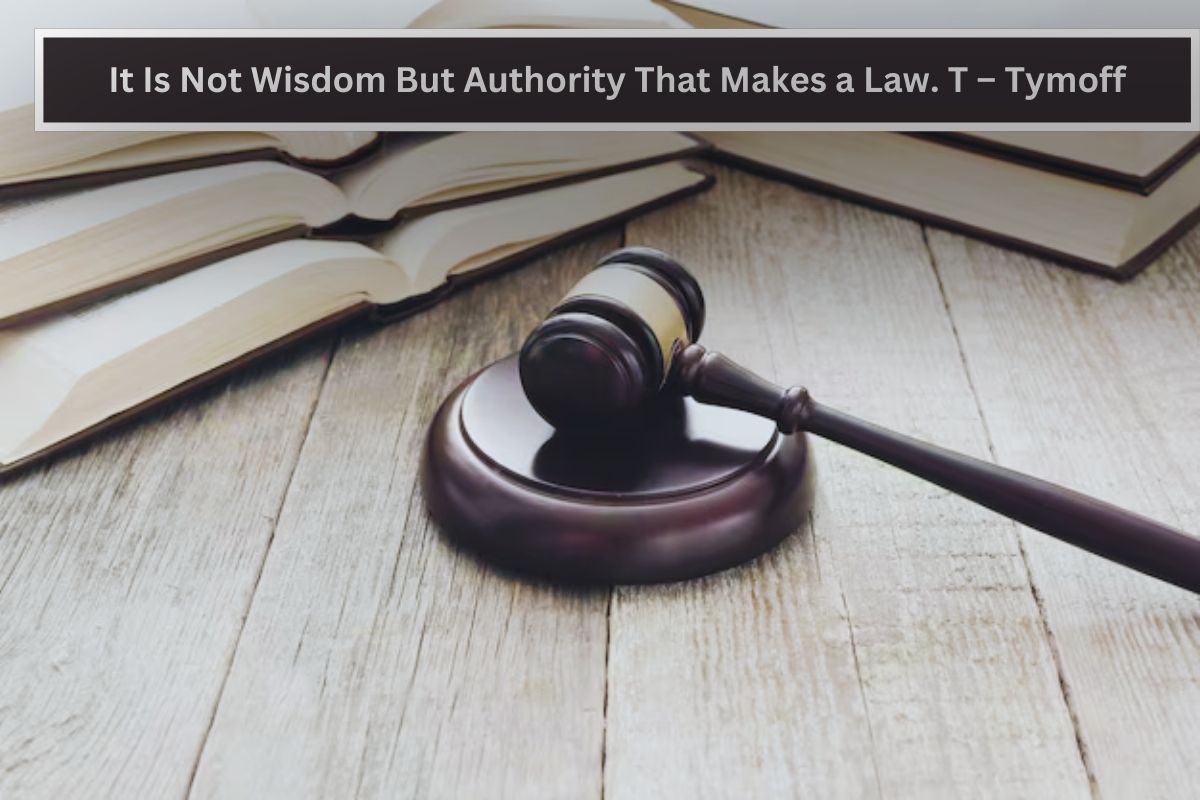It Is Not Wisdom But Authority That Makes a Law. T – Tymoff
Have you ever wondered why some laws feel just while others seem entirely out of touch with common sense? The phrase “It is not wisdom but authority that makes a law,” attributed to T. Tymoff, raises an intriguing question about the nature of law and governance. This post will explore the meaning of this statement, its implications for our understanding of justice, and the dynamics of authority in law-making.
In this blog post, we’ll discuss the essence of law, the role of authority versus wisdom, and how these concepts interact in real-world situations. You’ll find clear explanations, engaging examples, and thought-provoking insights. So, whether you’re a legal enthusiast or simply curious about how laws impact your life, you’re in the right place!
The Nature of Law
What Is Law?
Law is a system of rules created and enforced through social or governmental institutions. Its primary purposes are maintaining order, protecting individual freedoms, and ensuring justice. But laws don’t just spring up out of thin air—they require authority to be established and upheld.
Authority vs. Wisdom
- Authority refers to the power or right to give orders, make decisions, and enforce obedience. In legal terms, this often comes from governments or regulatory bodies.
- Wisdom, conversely, involves sound judgment and the ability to make good decisions. While wisdom may guide moral or ethical behaviour, it doesn’t necessarily dictate legal frameworks.
This distinction is crucial. Laws can only exist if they are wise. Conversely, wise principles may sometimes translate into legal mandates.
Historical Context of Authority in Law
Understanding the historical development of law provides context for why authority has often taken precedence over wisdom.
The Divine Right of Kings
In medieval Europe, monarchs claimed their authority came from divine right. This meant they ruled not through reason but through supposed divine endorsement. Laws made by these rulers were often arbitrary and needed more wisdom than we would hope to find in modern legislation.
The Enlightenment
The Enlightenment era introduced a shift in thinking. Thinkers like John Locke and Montesquieu argued for the separation of powers and the idea that authority should derive from the consent of the governed. However, whether authority equates to just law remains contentious even in these ideas.
Modern Legal Systems
Today, most legal systems are built on democratic principles, where authority comes from the people’s will. Yet, just because a law is democratically enacted doesn’t guarantee it’s that wise or just.
The Role of Authority in Law-Making
Establishing Laws
Laws are created through a systematic process that usually involves several stages:
- Proposal: A legislator often proposes an idea for a new law.
- Debate: The proposal is debated in legislative bodies. This is where wisdom might come into play as lawmakers discuss the potential impacts.
- Voting: Legislators exercise authority when they vote on a proposed law. If it passes, it becomes law, regardless of whether the general populace considers it wise.
- Implementation: Once enacted, the law is enforced by authorities, such as police and judicial systems.
Authority in Enforcement
Even the wisest of laws can only be effective if enforced properly. Authorities have the power to interpret and apply laws, often leading to discrepancies between what is written and what is practised.
- Example: Consider drug laws. Many were enacted based on authority rather than wisdom. While the intention may have been to protect public health, enforcing these laws can lead to social injustices.
Implications of Authority Over Wisdom
Legal Injustices
When authority overshadows wisdom, we can see legal injustices emerge. Here are a few implications:
- Discrimination: Laws created without wise consideration can lead to systemic discrimination against certain groups.
- Public Distrust: When laws feel unjust, it breeds public distrust in authority and the legal system.
- Social Movements: People often feel compelled to fight against laws they see as unwise, leading to movements like civil rights protests.
The Need for Re-evaluation
There’s a growing consensus that laws should be re-evaluated to align more closely with societal values and wisdom. This doesn’t just mean changing laws but also reforming how they’re made and enforced.
Case Studies: Authority vs. Wisdom in Action
Prohibition in the United States
One of the most cited examples is the Prohibition era in the US (1920-1933).
- The Law: The 18th Amendment made the manufacture, sale, and transportation of alcohol illegal.
- Authority: This law was passed by Congress and ratified by the states, demonstrating the government’s authority.
- Outcome: The law led to widespread lawlessness and organized crime and its repeal. It highlighted the failure of authority when wisdom was disregarded.
The War on Drugs
Another significant case is the ongoing War on Drugs.
- The Law: Various laws have criminalized drugs, often based on moral authority rather than empirical evidence.
- Authority: Governments enacted these laws, citing the need for public safety.
- Consequences: Instead of reducing drug use, these laws have resulted in mass incarceration and socially significant implications, raising questions about the wisdom behind them.
The Balance Between Authority and Wisdom
A Call for Integration
Aa balance between authority and wisdom is essential to create effective and just laws. Here are some suggestions:
- Inclusive Law-Making: Engage diverse voices in the law-making process to incorporate different perspectives and wisdom.
- Data-Driven Policies: Use data and research to guide decisions rather than solely relying on traditional authority.
- Feedback Mechanisms: Establish systems that allow citizens to provide feedback on laws, ensuring they remain relevant and wise.
The Role of Education
Educating lawmakers and the public about laws’ implications can foster a deeper understanding of the balance between authority and wisdom.
- Law Schools: Legal education should emphasize ethical considerations and the social impact of laws, not just technical proficiency.
- Public Awareness Campaigns: These can inform citizens about their rights and the laws that govern them, promoting a more engaged populace.
Conclusion
The phrase “It is not wisdom but authority that makes a law” is a crucial reminder of the nature of our legal systems. While authority is necessary for establishing and enforcing laws, it should always remain the need for wisdom in law-making. Understanding this distinction can empower us to advocate for a legal system that is both just and effective.




-2-390x220.webp)
